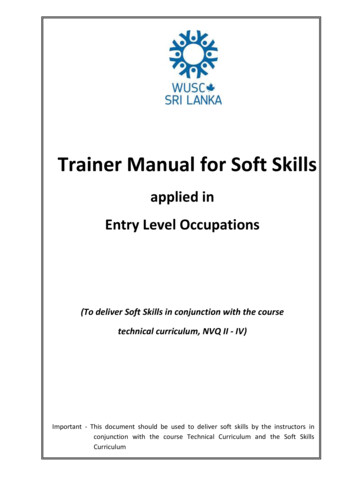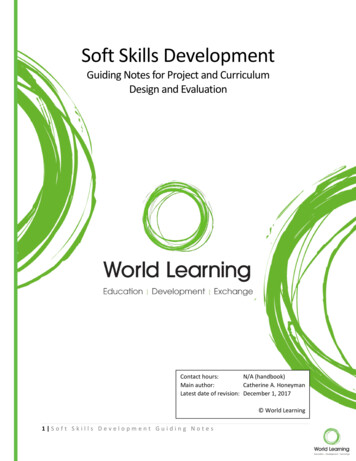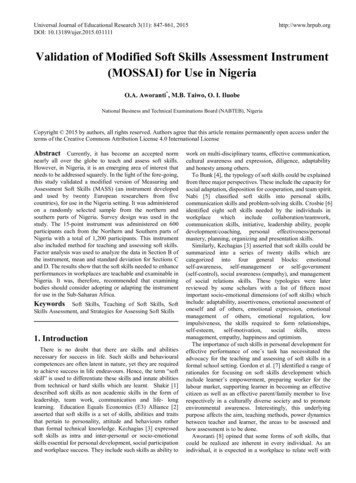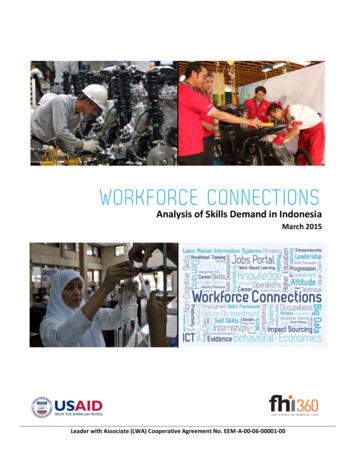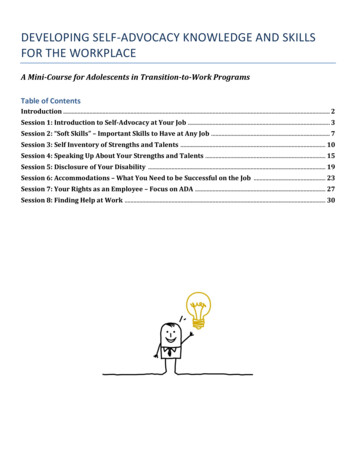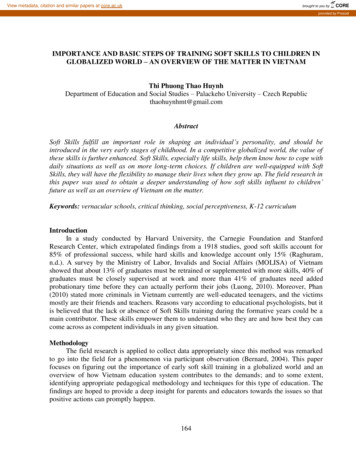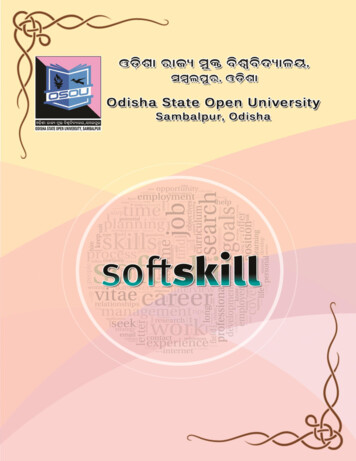
Transcription
Soft Skills
Prof. Kalyani Samantray Former Prof. & HOD, English, Utkal University –ChairpersonProf. Jatin Naik - Prof. in English, Utkal University –MemberProf. Asim Parhi - Prof. in English, Utkal University –MemberProf. Ashok Mohanty - Communicative English, SOAU –MemberDr. Ranjita Pati - Associate Professor, BJB College –MemberDr. Abhilash Nayak - Regional Director, IGNOU –ConvenerMiss Sulochana Das – Principal, School of Nursing – MemberCourse EditorCourse Writer Dr. Sharmila Subramanian , Principal AsthaDr. Sushanta MoharanaSchool of Management. Ms Debidatta Das Mohapatra, AssociateProfessor, Astha School of Management Ms Sreerupa Ratha, Assistant Professor,Regional College of Management, Bhubaneswar Ms Prashansa Das, Academic consultantOSOU– Academic consultantOSOU, Former Principal,Regional College ofManagement, Bhubaneswar
Table of ContentsIntroduction to Soft skills . 1Unit -I Communication skills . 13Unit II Body language and Etiquettes . 41Unit III Group discussion and Interview skills . 62Unit IV Presentation skills . 81Unit V Emotional Intelligence. 102Unit VI Time Management Skills . 121Unit VII Preparation of CV . 137
INTRODUCTIONSOFT SKILLSSoft skills get little respect but will make or break your career -Peggy klausSoft skills play an important role forSource : Googleachievingprofessionalgrowthandemployment. With the knowledge of softskills, one stand out in a crowd of jobseekers with even mediocre skill and talent.There is no doubt that hard skills i.e.knowledge and technical expertise areprime requirement, for employability butwithout soft skills it becomes difficult foreven highly talented people to corner a job.The most common traits asked by everyprospective employer are positive workethics, good attitude, and desire to learn and be trained.Good attitude being a behavioural skill cannot be taught. But consistent practice andtraining can instil that in a person. Right perspective and readiness to learn and turnthe situation to a positive outcome, take responsibility of one‘s action with thecapacity to take any challenge, so the job seekers must possess soft skill to attract theemployer.LEARNING OBJECTIVESThe objectives of the Skills Soft Training Manual are to give each student: A realistic perspective of work and work expectations To develop problem solving skills, To guide students in making appropriate and responsible decisions, To create a desire to fulfil individual goals, To educate students about unproductive thinking, self-defeating emotionalimpulses, and self- defeating behaviours.This manual is designed to develop leadership skills, communication skills, andbody language skills by having the student read aloud each page and discussing thecontent of the material.Odisha State Open University, SambalpurPage 1
Soft Skills are the non-technical skills, abilities, traits that workers need to functionin a specific employment environment. They include four sets of work placecompetencies:1. Personal Qualities andWork Ethics2. Problem- SolvingDecision making skillsand3. Oral Communication Skills4. Impersonal and EQ skillsSource : GoogleWhat are Soft Skills?Soft skills are personal attributes that enhance an individual's interactions, careerprospects and job performance. Unlike hard skills, which tend to be specific to acertain type of task or activity, soft skills are broadly applicable. Soft skills arepersonal attributes that describe an individual's ability to interact with others. Softskills, also known as people skills, complement hard skills to enhance an individual'srelationships, job performance and career prospects. Soft skills differ from field tofield, mostly due to different career attributes requirement though the basic peopleand social skills remain the same. Soft skills are the basic requirement for today'semployability.Soft skills are a combination of interpersonal people skills, social skills,communication skills, character traits, attitudes, career attributes and emotionalintelligence quotient (EQ) among others. Technical knowledge of any subject isconsidered hard skill. Soft skills are also called corporate skills. Soft skills can bemore useful and practical. A definition based on review literature explains soft skillsas a cluster of productive personality traits that characterize one's relationships in asocial environment with other people and the key three abilities/elements are peopleskills, social skills and personal career attributes, in other words social skills is anumbrella term for skills under this functional elements.Soft skills are related with insights, emotions, feelings, gut-instinct and (some wouldsay) an inner knowing. Because of this they are not taught passively as in the way ofOdisha State Open University, SambalpurPage 2
"hard skills". Hence soft skills are associated with EQ (Emotional Quotient) and EI(Emotional Intelligence) rather than with IQ.Soft skills can be said to incorporate all aspects of generic skills that include thecognitive elements associated with non-academic skills. Soft skills are identified tobe the most critical skills in the current global job market especially in a fast movedera of technology. The reorientation of education which is one trust of education forsustainability also relates the importance of these so-called - soft skills.Importance of soft skill:Soft skills are the skills concerned with working with other people, ensuringcustomer satisfaction, being a team player while delivering a high-quality productwithin budget and on time, and exceeding the expectations of stakeholders.Soft skills, on the other hand, are subjective skills that are much harder to quantify.Also known as "people skills" or "interpersonal skills," soft skills relate to the wayyou relate to and interact with other people.During our childhood days our parents probably correct us if behave in a rude orharsh way with our friends or siblings. But if inworkplace under similar situation no one will be Source : Googlethere to correct us and the ultimate consequencewill be fired off from the organization. There isa significant difference in the perception of softskills for a student and an employer. Instructorsteach the skills students need to get and keep ajob, while employers are more concerned withthe skills needed to perform the task at hand. Hard skills and soft skills are both important skills to have in theworking world.Employers need employees who are reliable, responsible problemsolvers with good social skills who have the ability to work on a teamso they seek graduates with soft skills obtained during study and workexperience rather than degree-specific knowledge and often opt tohire graduates from any discipline.Soft skills are essential for those entering the working world becausethese workers are the business leaders of the future. Business leadersmust obtain soft skills as well as hard skills in order to be viewed aseffective leaders.Odisha State Open University, SambalpurPage 3
The skills most demanded by today‘s employers are soft skills such asthe ability to work with others, to communicate effectively, todemonstrate initiative and self-direction, to solve problems, and todemonstrate a positive work ethic.Soft skills are very important as they help: To handle interpersonal relationsTo take appropriate decisionsTo communicate effectivelyTo have good impression and impact to gain professionaldevelopment.Soft skills describe career attributes that individuals should possess, such as teamskills, communication skills, ethics, time-management skills, and an appreciation fordiversity. In the twenty-first century workforce, soft skills are important in everybusiness sector. However, employers in business continuously report that newemployees are deficient in these soft skills.Soft skills are character traits and interpersonalskills that characterize a person's relationshipswith other people. In the workplace, soft skillsare considered a complement to hard skills,which refer to a person's knowledge andoccupational skills. Sociologists may use theterm soft skills to describe a person's "EQ" or―Emotional Intelligence Quotient," as opposedto "IQ" or "Intelligence Quotient."Source : GoogleTypes of Soft SkillsExpert opinions have been sought in the effort to determine the specific soft skills tobe implemented and used in higher institutions of learning. Based on the researchfindings obtained, seven soft skills have been identified and chosen to beimplemented in all institutions of higher learning here. They are:i.Communicative skills.ii.Thinking skills and Problem solving skills.iii. Team work forceiv.Life-long learning and Information ManagementOdisha State Open University, SambalpurPage 4
v.Entrepreneur skillvi.Ethics, moral and professionalismvii.Leadership skillsEach of the above soft skills comprised of several sub-skills. These sub-skills aredivided into two categories of implementation. The first category delineates the softskills that every individual must have and the second category represents soft skillsthat are good to have. Despite the emphasis being put on the soft skills that must bepresent (must have), it is also encouraged to inculcate the soft skills that are good tohave. All elements of soft skills must be acquired by each individual student andevaluated effectively and comprehensively. Table -1 shows the seven soft skills andthe two categories of sub-skills respectively.It can be observed that education is an essential tool for achieving sustainability. Weall realized that the current economic development trends are not sustainable and thatpublic awareness, education and training are the key elements to move our societytowards sustainability. Only a quality future human capital can envisiondevelopment of its nation to meet the needs of the present without compromising theability of future generations to meet their own needs. Therefore, the inculcation ofsoft skills among the students will be two prongs, to produce quality human capitaland to develop their knowledge, understanding, values and skills as well. How thetwo skills blend together will be discussed here.Table -1 Type / Elements of Soft Skills“Must Have” and “Good To Have”No. Soft Skills1.CommunicativeSkillsMustHaveElements (SubSkills)Ability to her orally or inwritingGood To Have Elements (Sub-Skills)Ability to practiceactivelisteningskill and respond.Ability to communicate with individualfrom a different cultural background.Ability to presentclearlyandconfidently to theaudience.Odisha State Open University, SambalpurAbility to usepresentation.technologyduringAbility to discuss and arrive at aconsensus.Abilitytoexpandcommunicative skill.one‘sownAbility to use non-oral skills.Page 5
2.Ability to identifyandanalyseproblemsindifficult situationandmakejustifiableCriticalThinkingand evaluation.Problem SolvingSkillsAbility to alysisandevaluatediscussion.Ability to think beyond.Ability to make conclusion based onvalid proof.Ability to withstand and give fullresponsibility.Ability to understand and accommodateoneself to the varied workingenvironment.Ability to findideas and look foralternativesolutions.Ability to build agoodrapport,interact and workeffectivelywithothers.3.Team WorkAbility to give contribution to theplanning and coordinate group work.Responsible towards group decision.Abilitytounderstandandplay the role of andrespectother‘sattitude, behaviorand beliefs.Odisha State Open University, SambalpurPage 6
4.Life-LongAbility to find andLearning& manage relevantInformationinformation fromManagementvarious sources.SkillAbility to develop an inquiry mind andseek knowledge.Ability to receivenewideasperformsautonomylearning.Ability to propose business opportunity.Ability to identifyjob opportunities.5.6.EntrepreneurshipskillAbility to build, explore and seekbusiness opportunities and job.Ability to be environment andsocialculturalaspectsEthics, Moral &professionally.ProfessionalAbility to practice ethical attitudesbesides having the responsibilitytowards society.Ability to analysemakeproblemsolving decisionsrelated to ethics.Knowledge of thebasic theories ofleadership.Ability to understand and take turns as aleader and follower alternatively.Ability to supervise members of a group.7.Leadership skillAbility to lead aproject.Odisha State Open University, SambalpurPage 7
It can be observed that education is an essential tool for achieving sustainability. Weall realized that the current economic development trends are not sustainable and thatpublic awareness, education and training are the key elements to move our societytowards sustainability. Only a quality future human capital can envisiondevelopment of its nation to meet the needs of the present without compromising theability of future generations to meet their own needs. Therefore, the inculcation ofsoft skills among the students will be two prongs, to produce quality human capitaland to develop their knowledge, understanding, values and skills as well. How thetwo skills blend together will be discussed here.(1)Communicative SkillsThe communicative skills involve effective communication in both the nationallanguage and English languagein different contexts and withdifferent people. There areeightsub-skillsundercommunicative skills of whichthree are the must have skillsand five are the good tohave skills.Communicativeskills are an integral part of anySource : Googleeducation system either inhigher education or lower education. As mentioned earlier, in many countries, basiceducation or primary education is mandatory and it focuses on reading, writing andciphering. People learn to read books, write letters, figure accounts and developskills necessary to fulfil their expected roles in their households and community. Atthis very level, emphasis has been given to develop the communicative skills ofindividual so that by the time they leave college, they are able to participate in publicand community activities and decision making. What is found to be missing in thenation‘s present human capital is the lack of communicative skills. The absence ofgood communicative skills somehow or rather has an influence on the poorpresentation of their views and decisions made to gain other‘s confidence andrespect. Communicative skills have also been greatly emphasized in the reorientationof basic education for ESD (Education for sustainable development) which is: theability to communicate effectively (both orally and in writing). The communicativeskill seemed to be one important component that lacks in the future human capital.The incompetence of the future graduates to master both languages will be a set-backto a lot of potential development and advancement of the country. Thus, this is agood time for reorientation of the curriculum of higher institutions to embedcommunicative skills.(2)Critical Thinking and Problem Solving SkillsThis skill includes the ability to think critically, creatively, innovatively andanalytically. It also involves the ability to apply knowledge and understanding tonew and different problems as well. For ESD to be successful, it must give peopleOdisha State Open University, SambalpurPage 8
practical skills that will enable them to continue learning after they leave school, tohave a sustainable livelihood and to live sustainable lives. The critical thinkingskills, skills to organize and interpret data and information, skills to formulatequestions and the ability to analyze issues that confront communities are greatlyaddressed in the reorientation of basic education in ESD. The following are someexamples of skills that comply with ESD and some of these skills are similar to thesoft skills being emphasized in the curriculum of higher education. The ability tothink about systems (both natural and social sciences).i.The ability to think in time-to forecast, to think ahead, and to plan.ii.The ability to think critically about value issues.iii.The ability to separate number, quantity, quality and values.All the above skills are important and students will require them as adults.(3)The Skill of Team WorkThe ability to work with people from different social cultural background to achievea common goal, students are encouraged to play their role in the group and to respectopinions and attitudes of others in the group. They are also expected to contribute tothe group‘s plan and coordinate the group‘s effort besides being responsible to thegroup‘s decision. This skill is also part of ESD as stated in the reorientation of basiceducation: the ability to work cooperatively with other people. If the future humancapital can attain these skills, we can be rest assure that the future generation willcollaborate ideas and cooperate a taskforce towards the well-being of the nation.(4)Life-Long Learning and Management of InformationThis skill involves an effort to learn to be independent or self-regulatedlearning in acquiring skills and new knowledge. The ability to find and managerelevant information from various sources is also a criterion of this soft skill. Besidesthis, students are also expected to develop an inquiry mind and crave for knowledge.As mentioned earlier, these characteristics are equally important in ESD in order foran individual to be media literate and consumer knowledgeable. Life-long learningwill enable individuals to accumulate as much knowledge and skills over theyears. The ability to manage information well will allow an individual to distinguishbetween good and bad, to adopt the best practices and to make sound decisions.(5)Entrepreneurship skillEntrepreneurial skill is the ability to seek business opportunity and develop riskawareness. It also involves being creative and innovative in activities related tobusiness and tasks. To design and plan business propositions and the ability to beself employed. This skill can in some ways contribute to the society if the trainingand practice is done for a good purpose.(6)Ethics, Moral and ProfessionalOdisha State Open University, SambalpurPage 9
The ability to practice a high moral standard in professional tasks and socialinteraction. This skill also includes the ability to analyze ethical problems and makeproblem solving decisions. Having a sense of responsibility towards society isanother criterion of this soft skill.(7) Leadership skillLeadership skill is the ability to lead various activities and tasks in an organisation.This is an important criterion in ESD for planning and implementing ideas in agroup. This skill is also important to lead in discussion and make decision.Essential soft skills to be stressed upon Communication Skills: Effective Communication is a two wayprocess – sending the right message and to the right person. Effectivecommunication is the communication which produces intended ordesired result‖ Body Language or grooming skills: Body language is controlled byyour subconscious mind, so a reader can actually understand if there‘sa difference in what we are saying and thinking. Points to remember: Never be up tied or stiff while making movements. Avoid body language that may be misunderstood or look A consistent eye contact is a positive sign and must be used Avoid fiddling with things around. It may distract the attention Each body part movement signifies something and helps ininterpreting. E.G. Standing with hands on hips signifiesaggressions, nodding signifies agreement and active listening,biting nails signifies nervousness. Unlike emails, body language does not give time to think. Hencethey must be used appropriately. Etiquettes: Etiquette in simpler words is defined as good behaviourwhich distinguishes human beings from animals. Human Being is asocial animal and it is really important for him to behave in anappropriate way. Etiquette refers to behaving in a socially responsibleway.Odisha State Open University, SambalpurPage 10
Group discussion skill: Group discussions occur in many differentformats – from very informal ones between friends to highlystructured and challenging discussions included as part of a selectionprocess. Developing group discussion skills is useful for everyday lifeas we regularly find ourselves having discussions amongst friends,family and colleagues. These may vary from very informal chatsabout day-to-day things, to more serious topics, for example adiscussion about a recent news story or a problem that needs to besolved. Presentation skills: Presentations skills and public speaking skills are veryuseful in many aspects of work and life. Effective presentations andpublic speaking skills are important in business, sales and selling,training, teaching, lecturing, and generally feeling comfortablespeaking to a group of people.Developing the confidence andcapability to give good presentations, and to stand up in front of anaudience and speak well, are also extremely helpful competencies forself-development and social situations. Interview skills: Interviewing skills are actions candidates take during jobinterviews that make them stand out. These actions can include properinterview behaviour, controlling nervousness or asking intelligent questions.If you have interviewing skills, you will probably receive more job offersthan those without them. You are better at convincing interviewers you arethe right candidate for the job. The best way to acquire interviewing skills isthrough practice. Hiring managers must also have interviewing skills so theychoose the right candidates for jobs. Emotional Intelligence.: Emotional intelligence (EI) is the capability ofindividuals to recognize their own, and other people's emotions, to discernbetween different feelings and label them appropriately, to use emotionalinformation to guide thinking and behavior, and to manage and/or adjustemotions to adapt environments or achieve one's goal Time Management: Time management is the process of planning andexercising conscious control over the amount of time spent on specificactivities, especially to increase effectiveness, efficiency or productivity.Odisha State Open University, SambalpurPage 11
The basis of time management is to take care of: Creating an environment conducive to effectiveness Setting of priorities Carrying out activity around prioritization. The related process of reduction of time spent on non-priorities Incentives to modify behavior to ensure compliance with time-relateddeadlines.All the above mentioned skill we shall discuss in detail in coming units To have abasic idea about soft skills p[lease go through the video links provided below for abetter understanding of subject. WhatAreSoftSkills?https://www.youtube.com/watch?v Tiy2LON r050&list PL2n89DCIolGAxtotA-U6PwusRW85mLN36 Professional Career Guidance For Jobs in Hindi-Importance Of Soft Skills https://www.youtube.com/watch?v 8ktDvgjgOXQ 10 Soft Skills You Need https://www.youtube.com/watch?v mGtHgRFgYZ4&t 13s Motivational Video in Hindi -How Soft Skills Training helps https://www.youtube.com/watch?v DCaPZt4ZEnY Soft Skills By Raghavendra - Part - 1 (Campus Recruitment Training) https://www.youtube.com/watch?v caJJyoAyBBs Soft Skills By Raghavendra - Part - 2 (Campus Recruitment Training) https://www.youtube.com/watch?v KDNPyJOC0fgOdisha State Open University, SambalpurPage 12
UNIT-ICommunication SkillsLearning ObjectivesAfter completion of the unit, you should be able to: Explain the meaning and definition of Communication.Understand the purpose and significance of Communication.Describe various types of Communication.Explain the elements involved in the Communication Process.Understand the Barriers to Effective Communication.Know the importance and relevance of Soft Skills.Structure1.1 Introduction1.2 Definitions1.3 Scope and Importance of Communication1.4 Types of Communication1.5Levels of Communication1.6 Effective Listening1.7 Communication Process1.8 Barriers to Effective Communication1.9 Overcoming Communication Barriers1.10 Let‘s Sum-up1.11 Key Terms1.12 Self-Assessment Questions1.13 Further Readings1.14 Video links for references1.15 Model QuestionsOdisha State Open University, SambalpurPage 13
1.1 INTRODUCTIONEveryday at work and at home, in politics, commerce, education, sport,entertainment and the financial world whatever we do in everything there is theinvolvement of communication -. Communication touches every sphere of our lives.It is the basic requirement for anyone in any job or position for anyone in any publicor private company to hold his or her job without mastering the skills of how tocommunicate with employees, handle the media or speak in public. But the essentialthing is balance - it is important to have knowledge but you must also have theability to communicate that knowledge effectively.To communicate with one another is a compulsive urge of human beings. There canbe no mutual understanding without communication, mutual understanding is thecore of human relations. Communication is like birth, death, breath and wanting tobe loved as a part of itself. Man is a communicating animal, he alone has the powerto express in words. Sight, sound, touch, smell and taste are the modes of exchangeof messages. Communication is the story of man and his efforts to communicateeffectively. Civilisation and culture progress to the extent communication has madethese possible.The word "communication" is derived from the Latin word communist, which meanscommon. In its application, it means a common ground of understanding. It is aprocess of exchange of facts, ideas, and opinions and as a means that individuals ororganisations share meaning and understanding with one another. In other words, itis the transmission and interacting of facts, ideas; opinions, feelings or attitudes.Communication is an interdisciplinary concept because theoretically, it isapproached from various disciplines such as mathematics, accounting, psychology,ecology, linguistic, systems analysis, etymology, cybernetics, auditing etc.1.2 DefinitionsCommunication means sharing or exchange of thoughts or ideas. OxfordDictionary defines communication as, ―the transfer or conveying of meaning‖.Communication is the art of being understood- Peter Ustinov“The process of passing the information and understanding from one person toanother. It is essentially a bridge of meaning between the people. By using the bridgea person can safely cross the river of misunderstanding‟‟.- Keith DavisOdisha State Open University, SambalpurPage 14
Communication is transfer of information from one person to another, whether ornot it elicits confidence. But the information transferred must be understandable tothe receiver–G.G. BrownAmerican Society of Training Directors: 'The interchange of thought orinformation to bring about mutual understanding and confidence or good humanrelation."Newman and Summer: "Communication is an exchange of facts, ideas, opinions,or emotions by two or more persons. Communication is also defined as aninterrelated approach by words, letters, symbols, or messages and as a way that oneorganisation member shares meaning understanding with another.“Leland Brown: "Communication is the transmission and interchange of facts,ideas, feelings, or course of action.‖Most of the scholars use a working definition of communication that is―Communication is a process of sharing or exchange of ideas, information,knowledge, attitude or feeling among two or more persons through certain signs andsymbols or language- as you may call it‖.1.3 Scope and Importance of CommunicationIt is essential for the sender to understand the scope, and for the recipient tounderstand the purpose of the communication. If these understandings do not exist,then there is little chance of the communication being effective. Additionally,although the recipient who must understand the purpose, it is the responsibility of thecommunicator to ensure that the purpose is clearlyidentified.ScopeThe scope of communication is very wide andSource : Googlecomprehensive. It is a subject of almost unlimiteddimensions and is an interdisciplinary one. It is a two-way process involving bothtransmission as well as reception. It is a continuous process of exchange of facts,ideas, feelings, attitudes, opinions, figures, and interactions with others. In theprocess, it uses a set of symbols; symbols may be words, action, pictures or figures.Communication, however, does not mean downward movement of sendingOdisha State Open University, SambalpurPage 15
directions, orders, instructions etc. It is only one-way communication. The scope ofcommunication can be evaluated and analysed from different point of views.1. Communication in social dimensions: Communication helps to ensure thesocial enlightenment of the people. It really plays a vital role in thedetermination of the social behaviour of the human being. It motivates thepeople according to their own interest and makes them aware of the hazardsas well as beneficial things. It works as an instructor and means oftransformation in the fast changing society. The different forms ofcommunicative techniques entertain the society that they can be rela
Soft Skills are the non-technical skills, abilities, traits that workers need to function in a specific employment environment. They include four sets of work place competencies: 1. Personal Qualities and Work Ethics 2. Problem- Solving and Decision making skills 3. Oral Communication Skills 4. Impersonal and EQ skills
